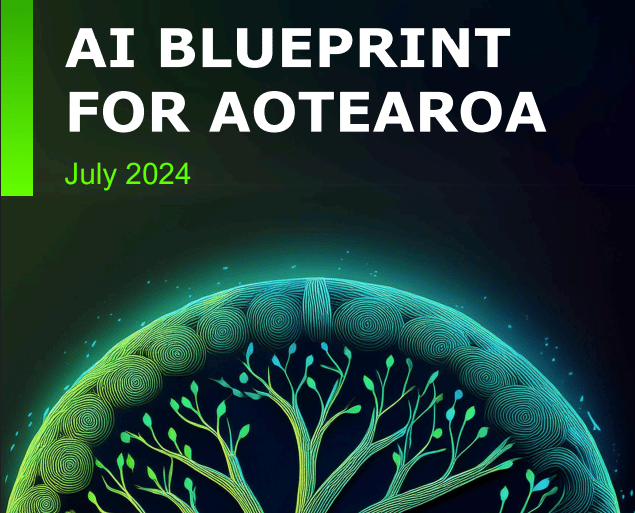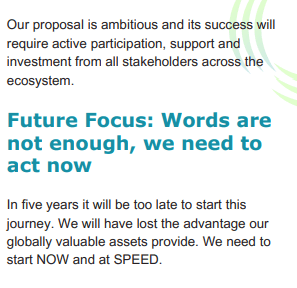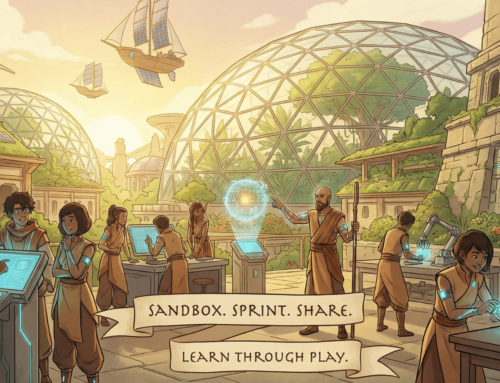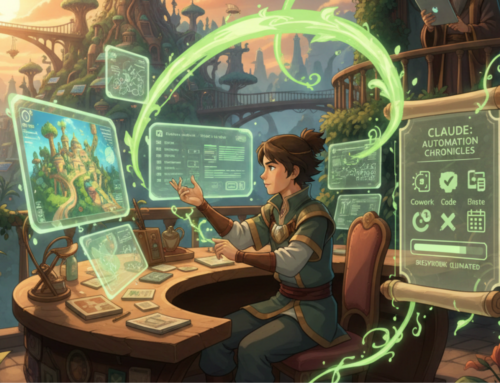“We are the AI Generation.”
– Doreen Bogdan-Martin
Last week I published a scathing teardown of the 22-page AI Strategy published by the New Zealand government. (Read that teardown here.)
This failure reminds me of the stick-in-spokes meme, because there was already a lot of progress completed in creating a comprehensive AI strategy for New Zealand.
The first version of the AI Blueprint for Aotearoa was published in July 2024, by the NGO (Non-Governmental Organisation) the AI Forum New Zealand.

In addition to publishing this amazing document, and hosting the annual Aotearoa AI Summit, they are currently convening working groups to create an expanded and updated version of the Blueprint.
If the NZ government had just cribbed a few notes, or took their suggestions, then the national AI strategy would be as aspirational, as clear, and ambitious as the Blueprint.
Here’s 7 reasons why the Blueprint is a superior strategy for Aotearoa:
1. Measurable KPIs
Unlike the Government’s strategy document, the Blueprint names numbers. They want:
- Top 30 status in the Government AI Readiness Index
- Top 25 Status in the Global AI Index
- Top 10 for productivity in OECD countries using AI
These aren’t just aspirations – they’re goals.
(Oh my goodness, I caught myself writing that sentence, and I realised it was a typical AI Slop trope. I’m writing this article entirely by hand, so I’m cutting that line. But the point stands – a goal with specific numbers beats a vague aspiration, because it is more likely to happen.)
2. Specific Partnership Suggestions
The Blueprint proposes Aligned Strategic Statements of Intent to engage industry and research partners, both within and without New Zealand.
These SSIs would align industry efforts, collect commitment within the sector, and outline investment goals over the next decade.
3. Cultural IP Protection
The Blueprint explicitly names Māori governance, data sovereignty, and indigenous AI leadership as contributors to the shared AI future.
The AI Forum’s working groups are currently creating a quality mark for NZ-made creative. Tiaki AI is named in the 2024 document, and we can expect more details on it when the 2025 document is complete.
The Government’s strategy mentions Māori data sovereignty, but offers no specific steps or initiatives (in keeping with it’s ‘hands off’ approach).
4. Strategic Pillars
The Blueprint categorises their activity into:
- New Opportunities
- Increasing Capabilities and Scaling Innovation
- Enhancing Adoption and Managing Risks
- Building Talent
Having these four clearly defined strategic pillars will help to inform investment decisions and prioritise new projects and policies.
The Government’s document offered no framework for strategic decision-making.
5. Training The Nation
While the NZ Government strategy does mention a couple of university-level AI education programmes, it doesn’t name numbers for further investment.
Academic institutions are struggling with AI on an existential level, so they cannot, in my opinion, be trusted to implement effective education on the topic.
It’s like asking the three little pigs to recommend the best set of butcher’s knives.
The Blueprint mentions workforce upskilling multiple times. They advocate:
- Establishing a national AI Education taskforce
- Including AI Literacy in all ongoing professional development
- Developing a community of practice, a country-wide network of AI educators, practitioners, and policymakers
- Educating the educators with comprehensive teacher education
- Leveraging the NZQA assessment framework
- Creating collaborative AI Centres of Excellence
- Targeting training programs to rural and agricultural professionals
They’ve really done their thinking, and it’s a comprehensive plan. Since I’m involved in workforce AI training in New Zealand, I can tell you firsthand that there is a lot of appetite for corporate education in AI.
6. Sector Focus
In addition to having a superior overall strategy, the AI Forum has also developed working groups for 6 specific sectors:
- Agriculture
- Architecture, Engineering, and Construction
- Creative Industries
- Education
- Environment
- Health
Each of these sectors approaches AI differently, and having such a robust set of perspectives gives the AI Forum strategic insight that the NZ Government just does not have.
7. Shared Data
Especially in industries that rely on proprietary data, there is a great difficulty in getting them to collaborate on shared AI tool. If a RAG or LLM is trained on McKinsey’s proprietary client data, it causes privacy and copyright concerns for Deloitte to access that data through a chatbot.
The Blueprint charges the Government with establishing an industry-led National Digital Twin. This innovative solution would enable the sharing of national datasets, without compromising security or proprietary rights.
This idea was published in the Blueprint in July 2024, a full year before the NZ Government’s AI Strategy. Did they decide not to use this idea, or did they not know about it, because the ChatGPT prompts they used to write the report didn’t pick it up?
Either way, there’s a lot of great ideas in this year-old document that the Government just did not use.
The NGO Leads the Way
After comparing these two documents, I am confident the AI Forum has the strategic vision, the access to human capital, and the practical understanding to lead Aotearoa into it’s AI adoption phase.
Last week, I was mighty disappointed in the Government’s AI strategy, because I expect strong leadership from government on important issues.
If, for whatever reason, they can’t provide strong leadership, they should appoint members of the private sector to take the reins and lead the way.
The Blueprint said this a full year ago:

🛠️ (4:41) Bookend Your Day with AI
📰 New AI News This Week
- OpenAI combines Operator and Deep Research for its first Agent
- Google search now calls businesses on your behalf to ask about pricing and availability
- The United Nations hosted the AI For Good Global Summit
The Future of Intelligence is Agentic
I’ve been leading training workshops for Agentic Intelligence, where I have joined as their Head of Learning & Enablement. You can see some of the workshops I lead here: https://agenticintelligence.co.nz/training
Reach out if you’d like to discuss an in-person workshop in Christchurch, or a webinar series for your team.





Leave A Comment